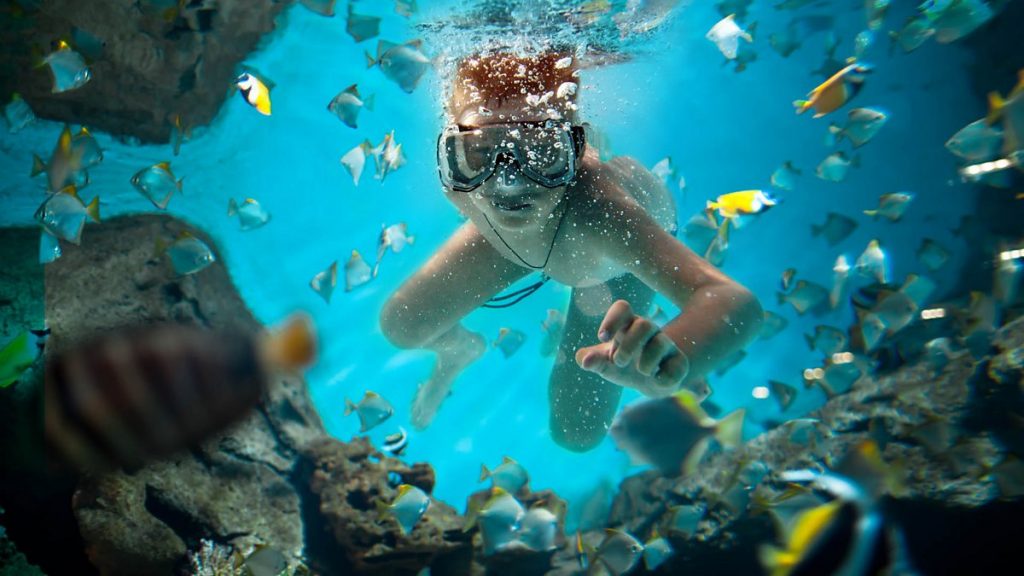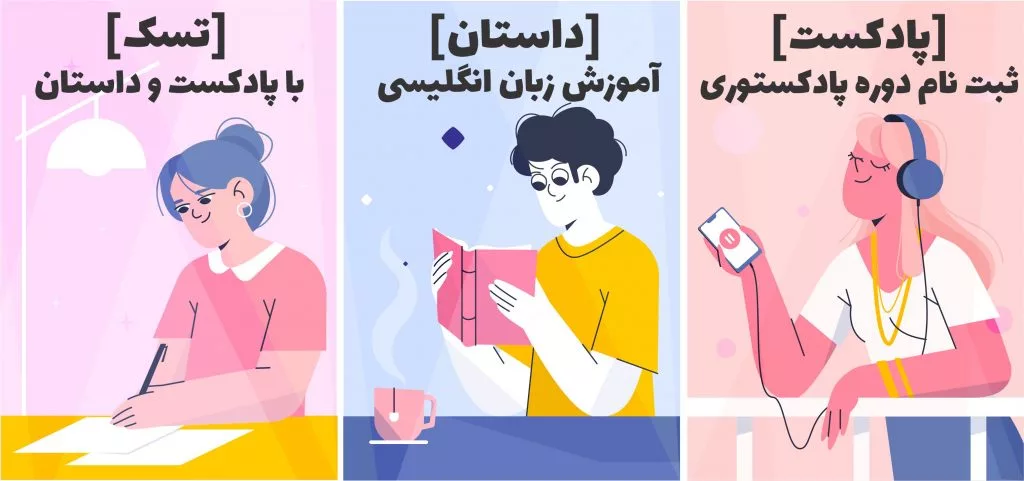پادکست انگلیسی BBC – لذت غواصی آزاد
غواصی آزاد ورزشی است که در آن افراد بدون حمل هیچ محفظه اکسیژنی به عمق آب شیرجه می روند و تنها با نگه داشتن نفسشان زیر آب می مانند. در پادکست انگلیسی BBC – لذت غواصی آزاد می شنویم که هربرت نیچ Herbert Nitsch که دارنده ی رکرد عمیق ترین غواصی آزاد است چرا و چگونه این کار را انجام می دهد. در طول مسیر هم کلمات جالب و کاربردی جدیدی یاد خواهید گرفت. نظر شما درباره ی غواصی آزاد چیست؟ آیا جرئت انجام آن را دارید؟
سوال پادکست انگلیسی BBC – لذت غواصی آزاد :
On dry land, at sea level, the pressure or weight of all the air above us is known as an atmosphere. How far underwater do you have to go until the weight of water is equal in pressure to another atmosphere?
A: 1 metre
B: 10 metres
C: 100 metres
به پادکست خوب گوش کن تا جواب رو پیدا کنی.
اگر می خوای گوش دادن به پادکست تا حد امکان برات ساده و کارآمد باشه مراحل زیر را دنبال کن:
هر روز به پادکست گوش کن. وقتی براش یه وقت ثابت در روز در نظر بگیری برات تبدیل به عادت میشه و این عادت هرروز پیشرفت میکنه.
پادکستی رو پیدا کن که موضوعش برات جالب باشه. وقتی از خود موضوع لذت ببری یادگیری هم برات لذتبخش میشه.
به پادکستی گوش کن که transcript یا متن داره. این بهت کمک می کنه تا کلمات و عبارات جدید رو به سرعت در متن پیدا کنی و ساختار انواع مختلف جمله رو خوب یاد بگیری.
پس از گوش دادن به پادکست با متن، در مرحله بعدی سعی کن بدون نگاه کردن به متن این کار رو انجام بدی. این کار مهارت شنیداری رو تقویت می کنه و کمک می کنه تا انگلیسی زبانان بومی را راحت تر درک کنی، حتی اگر خیلی سریع صحبت کنن.
اگه به پادکست انگلیسی گوش کردی و نتونستی کامل متوجه اش بشی، ناامید نشو. پادکست هایESL -English as Second Language بیشماری وجود دارن که برای سطوح مختلف، از ابتدایی تا پیشرفته طراحی شدن. مطمئنا هر روز می تونین یه پادکست مناسب با سطح خودت پیدا کنی.
فراموش نکن که هرچی بیشتر تمرین کنی در اون مهارت رشد میکنی! به قول انگلیسی ها: Practice makes perfect
واژگان کلیدی پادکست انگلیسی BBC - لذت غواصی آزاد
| معنی به فارسی | معنی به انگلیسی | واژه |
| ریه | the organs in our body we use for breathing | lungs |
| تمایل قوی به انجام کاری | a strong need or desire to do something | urge |
| ترسناک و مرموز | scary and mysterious | spooky |
| پرابهت و دلهره آور | overpowering and frightening in a way that makes you lose confidence | intimidating |
| محروم بودن از | to not have something you usually have, to have something taken away | to be deprived of |
| احساسات فیزیکی مانند بینایی و صدا | physical feelings and senses like sight and sound | sensations |
BBC 6 minute English - The joy of free diving

متن پادکست انگلیسی BBC - لذت غواصی آزاد
Neil
Hello. This is 6 Minute English and I'm Neil.
Georgina
And I'm Georgina.
Neil
Now Georgina, what do you know about free diving?
Georgina
Free diving is a sport where people dive underwater as deep as they can without carrying air tanks, so just by holding their breath.
Neil
That’s right. We’re going to find out today about a world record free diver. But first a question – and this is a physics one. On dry land, at sea level, the pressure or weight of all the air above us is known as an atmosphere. How far underwater do you have to go until the weight of water is equal in pressure to another atmosphere? Is it:
A: 1 metre
B: 10 metres
C: 100 metres
What do you think, Georgina?
Georgina
Well, water is much heavier than air, but there is lot of air above us, many kilometres, so I don’t think one metre of water is heavy enough. Same for 10 metres. So, I think 100 metres is the equivalent of 1 atmosphere.
Neil
OK. We’ll find out if you are swimming comfortably or completely out of your depth later. Herbert Nitsch holds the world record for the deepest free dive. In 2012 he reached a depth of 253 metres. Recently he spoke on the BBC World Service radio programme, Outlook about his experiences. He spoke about how he trained himself to hold his breath for a long time. Lungs are the organs in the body that hold the air that we breathe in, and he says that he trains himself not by starting with a big breath, but when his lungs are already empty. Why is that?
Herbert Nitsch
The reason why I do the empty lungs is that the urge to breathe comes earlier and this is when the training starts. Because when you hold your breath on full lungs, the urge to breathe comes like a few minutes in, but the time up to that point is no training at all. Only the time you have the urge to breathe and fight against it, that’s the time you’re actually training.
Neil
So, why train with empty lungs?
Georgina
Because you have to practise not breathing when you need to breathe.
Neil
Can you explain further?
Georgina
Of course. Normally our breathing is automatic. We don’t have to think about it. If you hold your breath there is a point when your body tells you that it’s time to breathe.
Neil
And at that point, most of us will take a breath, won’t we?
Georgina
Exactly. Our body and brain is telling us – go on, breathe, take a breath! This strong feeling to do something is called an urge. To hold your breath for a long time you have to ignore that urge, you have to fight against it. So to train to do that, it’s a waste of time taking a big breath, because holding your breath when you don’t need to breathe isn’t difficult – you have to practise fighting against that urge to breathe.
Neil
Nitsch did a lot of free diving in lakes in his home country of Austria. Diving in lakes is very different from diving in the ocean. Here he is describing the experience.
Herbert Nitsch
In the beginning it’s very spooky, and yes, it’s not a pleasant feeling at all in the beginning. It’s something actually quite intimidating, but after a while you get used to it and you learn to appreciate it actually that it’s so quiet. Quiet and you’re deprived of all sensations except the cold, of course, and so you hear your own heart beat because there’s absolutely no sound.
Neil
How does he describe the sensation?
Georgina
It’s very cold, dark and quiet when diving deep in lakes and at first he says the experience is spooky. This means it’s a little scary and mysterious – in the same way we might find a graveyard at night spooky – that kind of feeling.
Neil
And he also says it’s intimidating, which is a feeling of being frightened by something stronger and more powerful than you are.
Georgina
And you experience these feelings because you are deprived of all sensations. When you are deprived of something, it means you don’t have it, it’s taken away. And sensations are the way we experience the world, so sound, sight and smell. Diving in cold, dark silent waters you are deprived of many of our usual sensations, and that is spooky and intimidating.
Neil
Rather him than me. I don’t think I’d like that experience at all! Right, before we review our vocabulary, let’s have the answer to the quiz. How far underwater do you have to go until the weight of water is equal in pressure to another atmosphere? Georgina, what did you say?
Georgina
I thought 100 metres.
Neil
Well, that is actually the equivalent of 10 atmospheres! So the correct answer is 10 metres. Every 10 metres of depth in water is the equivalent to the weight and pressure of the air above us at sea level. There is a difference between fresh and salt water, but it’s not so much as to make your answer correct! Well done if you got that answer right.
Georgina
Well I was clearly out of my depth with that question.
Neil
You were! Now vocabulary. The part of our body that holds our breath is our lungs.
Georgina
A very strong need or desire to do something, like breathe, is an urge.
Neil
Something spooky is a little scary and mysterious.
Georgina
And it can also be intimidating, which means it’s overpowering and frightening in a way that makes you less confident.
Neil
And to be deprived of sensations, means to have certain feelings, like touch and hearing taken away. So Georgina, do you fancy free diving?
Georgina
Would I like to go hundreds of metres down in cold, dark, silent water without any breathing equipment? Let me think about that. I’ve thought about it – no thank you!
Neil
Not my cup of tea either – and speaking of tea, it is time for us to go and get a cuppa. That’s all from us today. Do join us next time and if you get lonely, you can find us online, on social media and on the BBC Learning English app. Goodbye for now.
Georgina
Bye!
امیدوارم از پادکست انگلیسی BBC - لذت غواصی آزاد لذت برده باشید.
گوش دادن به پادکست روش خوبی برای تقویت مهارت شنیداری و هم چنین یادگرفتن کلمات در بستر یک موضوع خاصه که این به تقویت مهارت مکالمه انگلیسی نیز کمک زیادی می کنه.
اگه تو هم از اون آدمهایی هستی که از گوش دادن به پادکست لذت می بره برات یه خبر خوب دارم! آموزشگاه مجازی آموزش زبان انگلیسی 24talk یه دوره طراحی کرده مبتنی بر پادکست و داستان کوتاه به اسم "پادکستوری - Podcastory". این دوره سعی کرده یادگیری زبان انگلیسی رو مناسب با نیاز و سطح زبان آموز به یه فرایند بسیار مفرح، موثر، سریع و کم هزینه تبدیل کنه.
همین الان می تونی با کلیک روی عکس زیر و ثبت نام در دوره ی آموزش زبان انگلیسی با پادکست و داستان ۲۴talk اولین و مهم ترین قدم رو برای یادگیری زبان انگلیسی برداری. وقت رو از دست نده!








